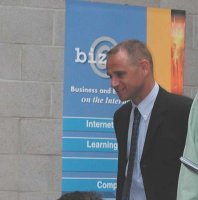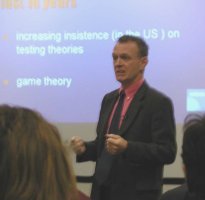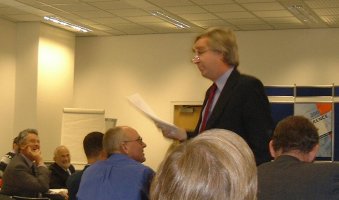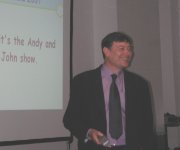
Conference Report
The first Developments in Economics and Business Education (DEBE) conference took place on 17th and 18th September 2001. The conference was a great success and showed conclusively the depth and variety of work that is going on in Economics and Business teaching and learning.
Each day had a different focus with the first day focusing on teaching and learning. The range of papers and workshops on this day was very broad and dealt with a range of issues from problem-based learning to assessment to the embedding of key skills. One session that unfortunately didn't take place was "Active Learning through the use of experiments and games" by Mary Hedges from the Auckland University of Technology. Unfortunately Mary was unable to make the conference in the aftermath of the terrorist attacks on the US on September 11th. The conference organisers were all the more disappointed as they had been looking forward to finding out why they had been asked to provide a couple of buckets of tennis balls - not the most conventional conference request! However, Mary has very kindly made a copy of her paper (.doc) available to us along with details of the games and experiments she was going to demonstrate.



Monday's Keynotes: Evan Davis, Paul Ormerod and Peter Day
Although invited to talk about the "real world" relevance of economics, BBC Economics Editor Evan Davis spoke in praise of rough approximation and back-of-the-envelope calculation. He gave a series of examples of economics principles which, while they might not be entirely true of the "real world", are tremendously useful in empowering people to understand many different processes and decisions. Whether or not the efficient market hypothesis is true, for example, adopting the hypothesis helps you see that a present share price is also a prediction of the future share price. Davis argued that the education provided by, say, an economics A-level should familiarise students with these tools and demonstrate their application.
Despite being the author of "The Death of Economics", Paul Ormerod was very upbeat about the subject. He focused on the way desktop computing allows the creation and manipulation of computational models that would he hopelessly impractical by hand. He gave an example of a model that explores market volatility, producing very chaotic behaviour through a simple set of rules. Such models, he predicted, will soon transform from being research tools to being a staple of university economics teaching.
BBC business journalist Peter Day's was a very witty but decidedly low-tech presentation, in which he lamented the ubiquity of PowerPoint in conferences and lecture theatres. He reminisced about the access to business decision-makers that his long career in radio has given him, but his focus was on the future. The trend for "mass customisation" undermines the traditional split between design, distribution and marketing and threatens to raise expectations: customers will increasingly demand not just a choice but exactly what they want. He warned that this trend is also being felt in education, with the consequence that we should be prepared to make curricula much more flexible and open-ended.

In the spirit of active learning the conference dinner was held at Explore - the hand-on science centre in the @Bristol complex. The combination of Bucks Fizz and lots of hand-on experiments meant that a lot more than just economics and business was learnt that evening. The dinner was the occasion for the launch of the new BusEcon courseware for business economics and also for the announcement of the first Annual Learning and Teaching Awards.
The second day had a focus on the use of Information and Communications Technology. Remembering the old adage of not working with children, animals or computers, the organisers were nervous. However, the day went very smoothly thanks to the sterling efforts of the technical staff of the ILRT and many people commented that the day had given them a lot of food for thought. There are details of many of the sessions on this day available. These include PowerPoint Presentations, downloadable spreadsheets and the workshop notes from the session on creating interactive assessment materials.

The keynote for the second day was unable to take place as planned as Bill Goffe and Bob Parks were unable to travel from the US to be with us. However, Andy Beharrell and John Sloman stepped in with a substitute keynote presentation on the topic of "Using the Internet for Economics and Business". Bill has kindly made a copy of a his slides available and delegates may be interested in having a look at these as well as the slides from the substitute keynote speakers, all with links to the featured sites.
Reactions expressed on the evaluation forms have been tremendously positive: an overwhelming proportion of ratings were "good" or "excellent", and almost all those who answered said that they would recommend a colleague to attend a future DEBE conference.
Report by Andy Beharrell and Martin Poulter

